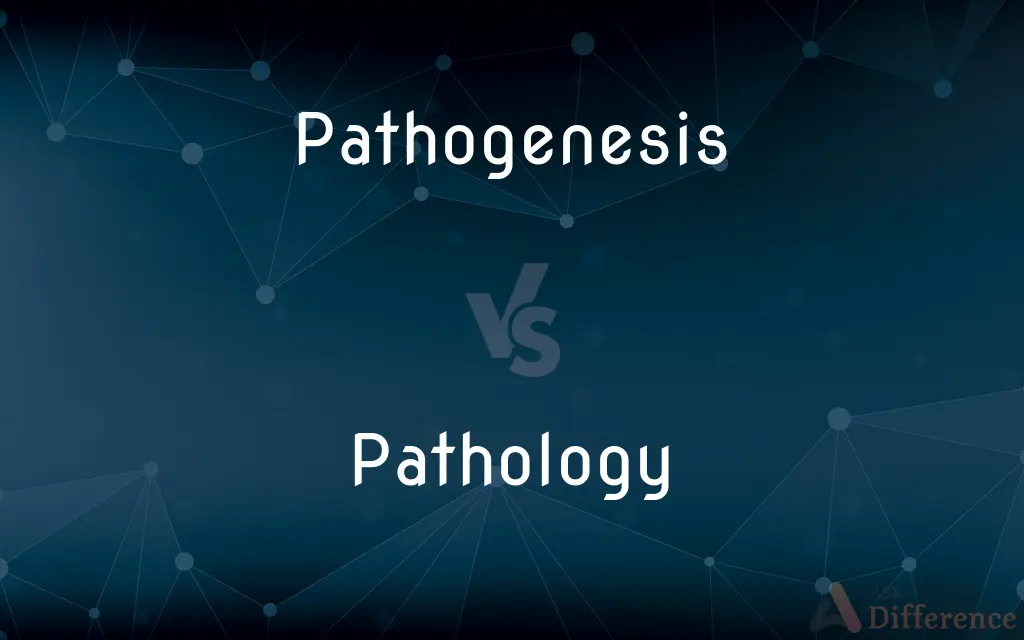Pathogenesis vs. Pathology — What's the Difference?
Edited by Tayyaba Rehman — By Urooj Arif — Updated on April 22, 2024
Pathogenesis explains how diseases originate and progress, focusing on mechanisms and stages; pathology studies the effects and causes of diseases, analyzing tissue changes.

Difference Between Pathogenesis and Pathology
Table of Contents
ADVERTISEMENT
Key Differences
Pathogenesis describes the development and progression of diseases, detailing the sequence of events from initial cause to final manifestation. Whereas, pathology investigates the broader aspects of diseases, including their causes, nature, and effects on the body.
Pathogenesis often involves understanding the molecular, biological, and physiological processes that lead to disease conditions. On the other hand, pathology examines the alterations in tissue and organ function as a result of these diseases.
In pathogenesis, the emphasis is on the dynamic process of disease development, such as the steps involved in the progression of an infectious disease or cancer. Whereas pathology is more concerned with the end results of these processes, often observed as changes in tissue samples under a microscope.
Pathogenesis is crucial for developing preventive measures and treatments for diseases by understanding their development stages. On the other hand, pathology is essential for diagnosis and the management of existing diseases through analysis of tissue and organ samples.
While pathogenesis provides insights into disease mechanisms and potential intervention points, pathology offers a detailed examination of disease effects, aiding in diagnostic precision and therapeutic strategies.
ADVERTISEMENT
Comparison Chart
Focus
Disease development and progression
Effects and causes of diseases
Methods
Studies molecular and physiological processes
Examines tissue samples, autopsies
Goal
Understand how diseases begin and evolve
Diagnose and understand disease manifestation
Application
Preventive strategies, treatment development
Diagnosis, disease management
Outcome
Insight into intervention points
Detailed structural and functional abnormalities
Compare with Definitions
Pathogenesis
The origin and development pathways of diseases.
Studying the pathogenesis of chronic illnesses can reveal preventive measures.
Pathology
The branch of medicine dealing with the causes and nature of diseases.
He specialized in pathology to better understand disease processes.
Pathogenesis
The progression of biological processes leading to a diseased state.
Researchers study cancer pathogenesis to find new therapeutic targets.
Pathology
The structural and functional changes in tissues and organs that cause or are caused by disease.
Pathology reports can determine the type of cancer affecting a patient.
Pathogenesis
The mechanism of development of a disease.
The pathogenesis of diabetes involves both genetic and environmental factors.
Pathology
The study of disease effects on the body.
Pathology helps in understanding the complications of infectious diseases.
Pathogenesis
The sequence of cellular and tissue events that take place from the initial contact with an etiological agent.
Understanding the pathogenesis of an infectious disease helps in creating effective vaccines.
Pathology
The practice of diagnosing diseases by examining bodily fluids, tissues, and organs.
A pathology review is essential for accurate cancer diagnosis.
Pathogenesis
The steps involved in the development of symptoms in a disease.
Pathogenesis of Alzheimer’s disease is marked by the accumulation of amyloid plaques in the brain.
Pathology
The scientific study of disease.
Pathology labs are crucial for analyzing disease specimens.
Pathogenesis
Pathogenesis is the process by which a disease or disorder develops. It can include factors which contribute not only to the onset of the disease or disorder, but also to its progression and maintenance.
Pathology
Pathology is the study of the causes and effects of disease or injury. The word pathology also refers to the study of disease in general, incorporating a wide range of biology research fields and medical practices.
Pathogenesis
The manner of development of a disease.
Pathology
The science of the causes and effects of diseases, especially the branch of medicine that deals with the laboratory examination of samples of body tissue for diagnostic or forensic purposes
Research people skilled in experimental pathology
Pathogenesis
The development of a diseased or morbid condition.
Pathology
The scientific study of the nature of disease and its causes, processes, development, and consequences. Also called pathobiology.
Pathogenesis
The origin and development of a disease.
Pathology
The anatomic or functional manifestations of a disease
The pathology of cancer.
Pathogenesis
The mechanism whereby something causes a disease.
Pathology
A departure or deviation from a normal condition
"Neighborhoods plagued by a self-perpetuating pathology of joblessness, welfare dependency, crime" (Time).
Pathogenesis
Pathogeny.
Pathology
The study of the nature of disease and its causes, processes, development, and consequences; now usually and especially in the clinical and academic medicine subsenses defined below.
Pathogenesis
The origination and development of a disease
Pathology
The clinical biomedical specialty that provides microscopy and other laboratory services to clinicians (e.g., cytology, histology, cytopathology, histopathology, cytometry).
The surgeon sent a specimen of the cyst to the hospital's pathology department for staining and analysis to determine its histologic subtype.
Pathology
The academic biomedical specialty that advances the aspects of the biomedical sciences that allow for those clinical applications and their advancements over time.
Those three pioneering pathologists went on to become leaders in building the pathology departments at several universities.
Pathology
Any of several interrelated scientific disciplines that advance the aspects of the life sciences that allow for such technological applications and their advancements over time.
The plant pathology and vertebrate pathology programs of the university's biology department
Pathology
Pathosis: any deviation from a healthy or normal structure or function; abnormality; illness or malformation.
Some sort of renal pathology was suspected, but imaging and even biopsy found no discernible pathology, glomerular or otherwise.
Some sort of mental and social pathology seemed to sweep over the discourse later that autumn.
Pathology
The science which treats of diseases, their nature, causes, progress, symptoms, etc.
Pathology
The condition of an organ, tissue, or fluid produced by disease.
Pathology
The branch of medical science that studies the causes and nature and effects of diseases
Pathology
Any deviation from a healthy or normal condition
Common Curiosities
How does pathogenesis aid in medical research?
Understanding pathogenesis helps in developing preventive and therapeutic strategies for diseases.
What tools are used in pathology?
Pathologists use microscopes, lab tests, and imaging technologies to study disease samples.
How do pathogenesis and pathology contribute to cancer research?
Pathogenesis provides insights into cancer development, while pathology aids in analyzing and diagnosing cancer types.
Can pathology and pathogenesis overlap in their studies?
Yes, both fields can overlap when studying the mechanisms and effects of diseases to enhance understanding and treatment.
What is pathogenesis?
Pathogenesis refers to the development and progression mechanisms of a disease.
What role does pathogenesis play in infectious diseases?
It clarifies how infections develop and progress, leading to targeted vaccine and drug development.
Why is pathology important in healthcare?
Pathology is critical for diagnosing diseases accurately and determining appropriate treatments.
What does a pathologist do?
A pathologist diagnoses diseases by examining tissues and fluids and studying their abnormalities.
Is pathogenesis the same as etiology?
No, pathogenesis refers to the development of a disease, while etiology focuses specifically on the cause.
How are chronic diseases studied in pathogenesis?
Pathogenesis looks at long-term disease development processes to identify potential intervention points.
What types of diseases require pathology analysis?
All diseases can benefit from pathology to ensure accurate diagnosis and management.
Share Your Discovery

Previous Comparison
Jaden vs. Jayden
Next Comparison
Cozy vs. SnugAuthor Spotlight
Written by
Urooj ArifUrooj is a skilled content writer at Ask Difference, known for her exceptional ability to simplify complex topics into engaging and informative content. With a passion for research and a flair for clear, concise writing, she consistently delivers articles that resonate with our diverse audience.
Edited by
Tayyaba RehmanTayyaba Rehman is a distinguished writer, currently serving as a primary contributor to askdifference.com. As a researcher in semantics and etymology, Tayyaba's passion for the complexity of languages and their distinctions has found a perfect home on the platform. Tayyaba delves into the intricacies of language, distinguishing between commonly confused words and phrases, thereby providing clarity for readers worldwide.














































